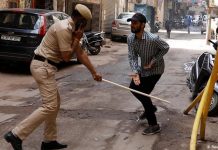INTRODUCTION
When the lockdown was imposed by the government, it aimed to reduce the threatens exposed to life however, the poor migrant workers who had come in search of better opportunities did not anticipate about what was to follow.
India was among the first countries who had sent help to lift the Indians who were stranded in China, Italy, Iran and Japan due to a restriction on international travel because of the coronavirus pandemic and the government agreed to bear all the expenses then. The rich flew their children stranded abroad, but why wasn’t there any certainty to the lives of the migrant workers stranded in cities they had moved to, in search of work and to earn bread and a livelihood for their loved ones?
The period of lockdown has brought several questions to the mind of the citizens like, “Does the Constitution not safeguard citizens, despite their economic status, by bestowing certain rights upon them?” and “Doesn’t the government have a constitutional duty to hear the plight of the poor too?” and many more.
When personally witnessing the conditions which the migrant workers live in generally, and the burdens they decide to carry in an unknown city, it is beyond our imagination to experience what they would go through during the pandemic.
PLIGHT OF THE MIGRANT LABOURERS AND VIOLATION OF THEIR CONSTITUTIONAL RIGHTS
In the first instance, the government granted just 4 hours before imposing the lockdown and now, those migrant labourers stranded in different cities were just considered mere burdens and left with no hopes. Few state governments offered shelter to around 1.25 million stranded migrants and according to the reports filed by the Ministry of Home Affairs ( MHA) in the Supreme Court,[1]more than half of them were in Kerala. But did the question of how exactly would the other labourers, stranded in other states, live without shelter or food ever come across the mind of the government?
We have also seen umpteen news reports on how the migrant workers have walked miles with their tiny tots, to reach their homes when left with absolutely no choice, which resulted in quite a few deaths, and reaching home is their priority today for which they are ready to do whatever it takes.
The World Bank in its recent report “COVID-19: Through a Migration Lens” states that “Lockdowns and loss of employment prompted a chaotic and painful process of mass return for internal migrants in many countries. Governments need to address the challenges faced by the internal migrants by including them in health services and cash transfer and other social programs, and protecting them from discrimination”.
When rumors of the train services commencing spread, thousands gathered with the hope of being able to meet their families at any cost, but they did not realize what was yet to happen would change and affect their lives for an indefinite period. The incidents seen in the past couple of months prove that the migrants have no food, no water left to survive, they also end up hiding in tanks, they’ve been pushed to the extent of starvation, and they sleep on footpaths or under flyovers sacrificing and waiting restlessly just so that the restrictions are eased for them to go back home safely. A survey published by ‘The Hindu’ states that 96% migrant workers did not get rations from the government, and 90% of them did not receive wages during the lockdown.[3]
Then as this goes on, we hear about a 12 year old child who died while walking for three days with the others who worked with her [Reported by NDTV here]. Now, after all this, as they still expect some kind deed to be done by the government, the police end up beating them up with their lathis even when they don’t seem to be violating the rules imposed [Indian Express], officials disinfect them in the open when returned to their state [BBC], and also abuse them. The workers are left with no option, but to somehow survive at any circumstances. Isn’t this mere ignorance of their constitutional rights? Who is answerable to those families of theirs, who depend on their small remittances to survive?
Article 14 and Article 21 of the Indian Constitution ensure right to equality to every citizen and right to life, liberty and the security of person respectively. But the above mentioned instances prove that there’s a clear demarcation of the amenities provided to the rich and the poorer sections of the society. When the rich gets food delivered to their homes and has good shelters to protect themselves, the migrant labourers on the other hand are not even provided with adequate food and money for their family and depend on unclean areas for shelters.
In Bachan Singh v. State of Punjab,[7] Justice P.N Bhagwati had observed that Rule of law permeated the entire fabric of the Indian Constitution and it excluded arbitrariness. According to him, whenever there is arbitrariness, there is denial of Rule of Law. So every action of the State should be free from arbitrariness otherwise the Court will strike the act as unconstitutional and as mentioned in the case of Kharak Singh v. State of Uttar Pradesh,[8] the Supreme Court held that “the term life is meant something more than mere animal existence.” In Francis Coralie v. Union Territory of Delhi,[9] the right to live includes the right to live with human dignity and all that is inclusive of bare necessities of life such as adequate nutrition, clothing and shelter over the head etc.
Now, when the third lockdown had been announced, once again the government decides to mock the rights of the migrant workers. They decide to arrange ‘buses’ for the workers, which means that it would take them forever to reach home, due to this, eight states protest and the revised circular declared that the Railways would operate “Shramik Special” trains [Economic Times]. Now, a sound of relief when finally heard by the workers, they lose hopes again when they were asked to pay full fares. Not only regular fares, but extra fifty rupees per passengers for “express charges” and food. It is again obliviousness to their basic rights that is proved here.
The PM CARES fund has failed to support the migrant labourers even though the objective of the fund is “To render financial assistance, provide grants of payments of money or take such other steps as may be deemed necessary by the Board of Trustees to the affected population.” [PMINDIA Website] Even though the government claims that the PM Cares Fund is in the nature of ‘private trusts’, it still cannot be justified on the denial of information to the public and as Section 19 of the Indian Trusts Act requires the trustees to present full and accurate information of the amount and state of the trust property to the beneficiaries as the ‘private trusts’ are created for the benefit of the public at large, every citizen is a constructive beneficiary and therefore the trust falls under the ambit of ‘public charity’ under Section 92 of the Code of Civil Procedure and therefore an exempt from fair public disclosure under Article 19(1)(a) of the Constitution is to be suspected. In Manohar Lal Sharma v. Narendra Damodardas Modi & Ors.,[5] it was contended by the petitioner that “the impugned trust has not either been created by Parliament/state legislator within Article 267 and it is neither passed by Parliament nor approved by the President of India. There is no ordinance/gazette notification in this regard.” However, the petition was summarily dismissed by the Supreme Court as lacking merit, therefore, the matter still remains controversial.
When the Centre has taken various measures under the Disaster Management Act, 2005 and the Epidemic Diseases Act, 1897 to issue instructions to states, it has ignored the Inter-State Migrant Workmen (Regulation of Employment and Conditions of Service) Act, 1979 which is an extremely relevant legislation to be put into effect today. Even though the Act is inadequate, it still sets out certain rights for migrant workers.
Under pressure, the Railways now decide to subsidize 85 per cent of the ticket fare for special trains arranged and asked the states to pay the rest 15 per cent. This invited the Congress to attack the government over the issue but the government in their response says that the states are bound to pay the fares and this was not demanded to be paid by the migrant workers.
On 13th May 2020, the Centre announced a tranche of Rs 20 lakh crore COVID-19 economic stimulus package but it has added to the existing criticism. The opposition termed it as a “disappointment”, and a “big zero” that had “nothing” for the migrant workers, even as the government hailed it as it reflected the government’s commitment towards creating jobs and stimulating the economy. The criticism against it by the opposition is appropriate as the package has nothing to offer for those who urgently and immediately need help.[NDTV]
There was a huge expectation that the package would be aimed at migrant workers, farmers and street vendors, who were striving to receive immediate relief given because of the distress suffered by them due to the lockdown for over 50 days now. However, the schemes introduced will most likely be implemented only over a longer term frame.
The announcement of free food grain supply for two months to 8 crore migrant workers without a ration card and outside the ambit of National Food Security Act was expected to provide some relief to migrant workers. But experts state that this entails resolving complicated logistical issues. Since every public distribution shop has a fixed number of registrants based on which the stock of food grains is supplied to the shop, allowing accessibility to non-cardholders may result in shortage of supplies at these outlets.
The ‘One Nation One Ration Card’ announced last year also suffers from these limitations and thus, this is unlikely to address the immediate issues.[Indian Express]
JUDICIARY’S APPROACH
Several PIL’s seemed to be filling up when the situation of the migrant labourers went downhill. The judiciary dismissed majority of them where the petitioners put forward their plea of seeking the Centre’s help in the situation and directing them to do the needful, keeping in mind the current scenario and the hardships suffered by the labourers.
In Balco Employees Union (Regd.) v. Union Of India & Ors[6], it was held that “PIL is not meant to be adversial in nature and is to be a cooperative and collaborative effort of the parties and the Court so as to secure justice for the poor and weaker sections of the society who are not in a position to protect their own interests.”
Even though it meant that a PIL’s sole purpose is to secure justice for the poor and weaker sections of the society who are not in a position to secure their own interests, the court seems to be oblivious to the harsh conditions in which the migrant labourers live during the lockdown.
The insensitivity of the Judiciary towards the issue was once again affirmed when the CJI, SA Bobde, questioned about the requirement of wages when the migrant labourers were already provided with meals as a response to the plea directing the government to provide them with wages for survival[Telegraph India] in furtherance of Harsh Mander & Anr. v. Union of India & Anr[7].
Several other PIL’s were filed by many activists seeking direction to the Centre to provide migrants food, transportation and shelter. The Court dismissed the petitions while stating that “It is impossible for the Court to monitor who is walking and not walking” and asks “How can we stop them from walking? How can anyone stop this when they sleep on railway tracks”[8]. This displays how the courts have chosen to remain silent on this issue by asking the workers to remain patient for their turn and CJI SA Bobde told in his interview to ‘The Hindu’ that “The Executive with its three M’s of Money, Men and Material is better-suited to deal with Covid-19.”
Even though the Supreme Court could have passed several directions which could have saved the lives of many migrant labourers, the court chose to remain ignorant to such issues and as it was rightly mentioned in Asiad Workers Case[9], “So far the courts have been used only for the purpose of vindicating the rights of the wealthy and the affluent. It is only these privileged classes which have been able to approach the courts for protecting their vested interests. It is only the moneyed who have the golden key to unlock the doors of justice.”
CONCLUSION
A series of events prove that during the pandemic, the most affected ones are the migrant labourers and their constitutional rights are at stake. Considering the fact that those basic rights cannot be violated at any cost, it is the duty of the government and the officials to make sure that no one’s rights are violated during such times. Even though the government has initiated plans to bring back migrant workers who are stranded internally and also those abroad, such plans could have been initiated in the beginning to avoid chaos and struggles that these poor workers had to witness due sheer ignorance of their rights. The industries on the other hand are worried because of the loss they will be experiencing once the economic activity restarts if the workers are unavailable, but this cannot be a valid reason to put the migrants in such a situation, and every possible way to ensure safety and to provide services to help these workers must come into effect.
[1] Alakh Alok Srivastava v. Union of India, 2020 SCC OnLine SC 32.
[2] Bachan Singh v. State of Punjab, 1982 AIR 1325.
[3] Kharak Singh v. State of Uttar Pradesh, AIR 1963 SC 1295.
[4] Francis Coralie v. Union Territory of Delhi, 1981 AIR 746.
[5] Manohar Lal Sharma v. Narendra Damodardas Modi & Ors, MANU/SCOR/24524/2020.
[6] Balco Employees Union (Regd). V. Union of India, (2002) 2 SCC 333.
[7] Harsh Mander v. Union of India, 2020 SCC OnLine SC 376.
[8] Alakh Alok Srivastava v. Union of India, 2020 SCC OnLine SC 352.
[9] People’s Union for Democratic Rights v. Union of India, 1982 AIR 1473.
You may also Like:
1. Fight Against Corona or Dignity – by Sudhanva Kumar JM and Piyush Vyas, Students at OP Jindal Global University, India.
2. Procedure established by law and due process of law’: Analysing India and the USA’s scenario – by Priya Kumari, LLM Student, National Law University, Jodhpur
3. Right to sleep as a fundamental right under Article 21: A myth or a dead letter – by Mr. Kaustav Ghosh, Advocate, High Court of Calcutta, India.







